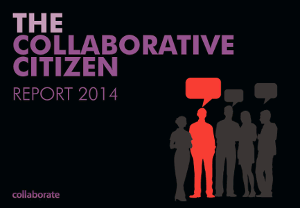Collaborate
|
|
'The Collaborative Citizen'
These stark findings are based on an Ipsos MORI poll (1) commissioned by Collaborate which said they present a challenge to all political parties in the run up to the General Election.
The report’s author’s Dr Henry Kippin and Lord Victor Adebowale said service provision is failing to keep pace with people’s needs.
Dr Kippin, director of Collaborate, said: ‘Citizens want to be treated as human beings- with dignity, respect, competence and understanding. ‘In public services, both state and market are falling short against this goal. Across the board they need to get better at engaging, enrolling and inspiring the public.’
Key findings from the Mori survey include:
* 79 per cent say public services treating them with respect and dignity is as important as giving them the final outcome they need. However, the elderly and the lowest grade workers in particular are not getting the dignity and respect they deserve.
* 27
per cent are willing to work with providers to improve the public
services they offer.
Yet only
14 per cent say they are always or often involved in decisions about how they
use services.
* Nearly 30 per cent of people believe government and public services should provide exactly the same services to everyone, regardless of their situation in life. This reflects a drop in support for equality of opportunity. The report warns it reflects the fact equality has been downgraded as a core goal under the current Coalition.
* 73 per cent of those surveyed feel the government has some responsibility to keep living standards manageable, help secure them a decent place to live and help with jobs and careers.
Since the financial crisis, the government and the public sector has focused more on putting the citizen at the centre of new commissioning plans.
However, Dr Kippin said that if organisations fail to embrace further change then the quality of services will be eroded and welfare will become stigmatised. Public services must get better at both understanding people and involving them in service design, he added.
He said: ‘These findings highlight the voices of citizens in a debate which is dominated by public finance and service demand. We need a new system of services to the public that puts the engaged citizen at its heart. The current debates on public service reform are too narrow.’
Julia Unwin CBE, chief executive of The Joseph Rowntree Foundation, said the report was a wake-up call for policymakers. She said: ‘More than ever, it is relationships and the balance of risk and trust between service users, providers and their communities which count. Public services must be driven by these relationships.’
Welcoming the findings, Dr Greg Parston, Executive Director of Centre for Health Policy Institute of Global Health Innovation, Imperial College London, said: ‘Today, citizens are treated as objects of policy making and of service delivery decisions, rather than as active participants in the changes that will directly affect their lives. The consequence is apathy, disillusionment and even anger.’
You can download a copy of The Collaborative Citizen report at www.collaboratei.com
Home About Us Upcoming Events Reports
![]() @CollaborateIns
@CollaborateIns




